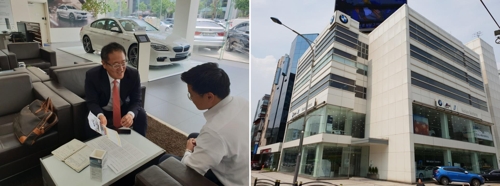
According to Yonhap News,
(DAEJEON=Yonhap News) Foreign carmakers are eyeing South Korea as an expanding market, industry sources said Thursday, as more local customers are opting for foreign brands that they perceive as prestigious and engaging to drive.
In 1987, foreign carmakers sold a total of 10 vehicles in the country, but three decades later, they account for nearly 20 percent of the domestic passenger car market, according to data from the Korea Automobile Importers and Distributors Association (KAIDA). It said imported car registrations have been moving up in leaps and bounds, hitting 8,136 units in 1997, 53,390 in 2007 and 233,088 in 2017.
"In the past, usually high-income earners like corporate executives and those holding professional jobs in their 40s and 50s bought imported cars. But these days, young customers in their 20s and 30s who can only be seen as being in the lower- and mid-income brackets are also visiting foreign car dealerships due to declining prices and a wide range of choices," KAIDA Vice Chairman Yoon Dae-sung said over the phone.
On top of demand generated by driving enthusiasts and the status foreign-made vehicles confer on the owner here, there seems to be another reason behind the growing appetite for imported vehicles, industry insiders speculated.
"Many younger people just cannot afford to buy a house due to soaring prices so they instead are eyeing the second-most expensive item, something that is within their grasp, which can be imported cars for many," Yoon said.
His view is echoed by Heo Yong-hoe, 31, representative of psychological contents lab Mind Plating.
"As young customers do not expect their financial status will improve greatly even after they land a job and earn steady wages, they seem to be less hesitant to pour money into expensive foreign-made cars that they desire," Heo told Yonhap News. The expert said that people seem to find satisfaction when they make such a choice.
Other observers said that this type of consumption trend, which may be alien to the older generation, has something to do with two social trends that many young people firmly believe in nowadays. These are wishing to enjoy "small but certain happiness" and the growing acceptance of the YOLO, or "you only live once," concept.
Moreover, imported carmakers provide a wide range of auto finance programs, so even young salaried workers who make entry-level salaries need not pay a lump sum of money up front to own the car of their dreams. This easily allows them to buy an imported car on a lease or installment program, a dealer at BMW's showroom in Gangnam, southern Seoul, said.
"A 33-year-old worker who earns 33 million won a year at a local food company bought a BMW 320d sedan at the discounted price of 43 million last month. He signed an installment program to pay 700,000 won per month for the next 47 months after making an advance payment of 10 million won," the dealer told Yonhap, asking not to be named.
Helped by such demand, imported carmakers sold a total of 116,798 autos in the January-May period, accounting for a hefty 18.27 percent of the local passenger car market. The market share rose from 5.13 percent two decades earlier, KAIDA data showed.
In particular, luxury carmakers Mercedes-Benz and BMW topped all other import brands by selling a combined 65,193 vehicles in Korea during the first five months. It was up 22 percent from 53,428 a year earlier, the latest data said.
KAIDA, moreover, forecast imported car sales will soar nearly 10 percent to 256,000 units for the whole of 2018 from the previous year.
The association further expects an increase in the overall number of imported cars sold in the country this year as Audi Volkswagen Korea resumed sales of their vehicles in November 2017. This comes after the company was forced to fully suspend sales of Volkswagen models since August 2016 and Audi cars since March 2017 due to the diesel gate emissions cheating scandal.
kyongae.choi@yna.co.kr
Copyrights Yonhap News. All Rights Reserved.
Reprint or redistribution without permission is prohibited.
** This article was translated from Korean.
Source: Yonhap News (July 05, 2018)










